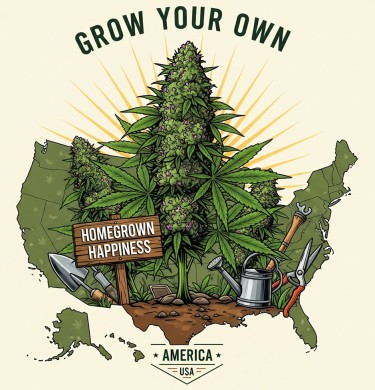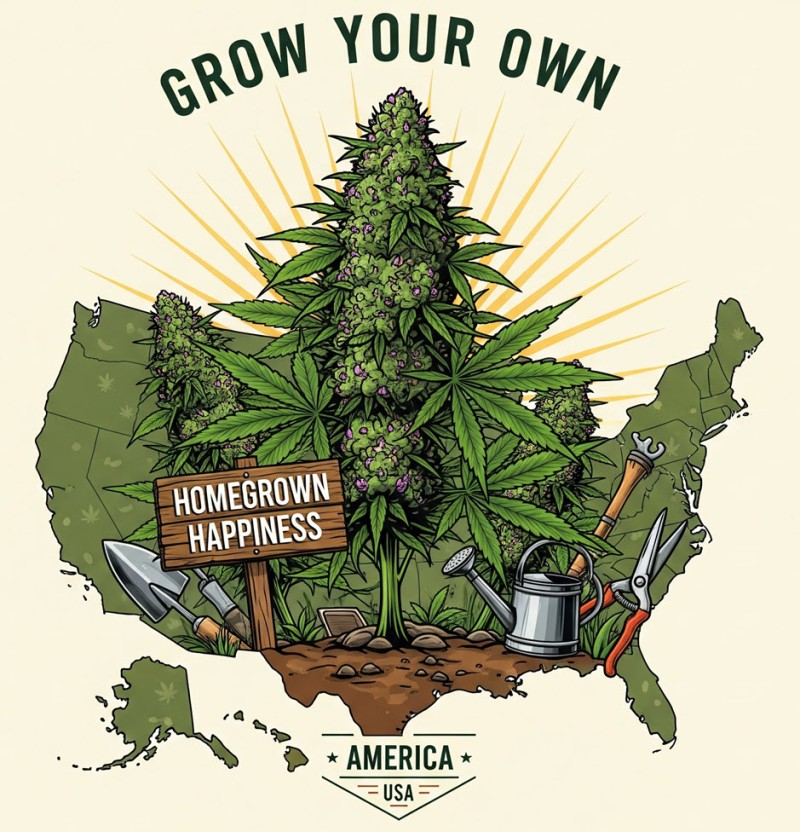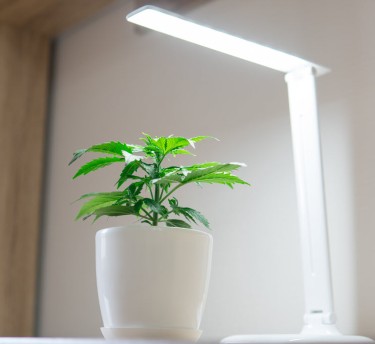
Grow Your Own – True Legalization
As I gaze out my window at the morning light filtering through the leaves of my garden, I can't help but reflect on the peculiar state of cannabis "legalization" across America. Here's a hard truth many advocates don't want to face: if you can't grow your own cannabis at home, it's not actually legalization. What you have instead is a carefully controlled cage where you're permitted to play – but only according to rules designed to benefit everyone except you.
Call me an anarchist if you must (many have), but I've spent too many years watching the convoluted dance of politicians and corporations to believe otherwise. True legalization means having the autonomy to cultivate this remarkable plant in your own soil, under your own care, without fear of prosecution. Anything less is merely a leasing of freedom – a temporary tolerance of your appeal that can be revoked at the whim of changing political winds.
The cannabis plant isn't just a commodity to be regulated, taxed, and controlled by corporate interests. It's a relationship between human and plant that extends back thousands of years. This relationship belongs to the people, not to regulators or corporations.
In this article, I'm going to lay bare exactly why growing your own cannabis is the only path forward that makes sense – for consumers, for communities, and even for governments serious about eliminating the illicit market. And if the powers that be aren't willing to relinquish this right? Well, throughout history, true freedom has rarely been granted – it's been taken.
Let's dig into the soil of this issue and get our hands dirty with the truth.
Addressing Modern Legalization Problems
When listening to opponents of cannabis legalization, you'd think the streets of legal states would be littered with stoned teenagers and car wrecks. The reality? Youth consumption rates have actually declined in most legal states. Road fatality statistics haven't shown the apocalyptic surge in cannabis-related crashes that prohibitionists predicted. And the much-feared "psychosis epidemic" remains elusive in population-level mental health data.
No, the real problems with modern cannabis legalization have nothing to do with these manufactured fears. The actual issues are far more mundane and predictable: excessive taxation, persistent illicit markets, and unchecked corporate greed.
Look at California, where combined state and local cannabis taxes can approach 40% in some jurisdictions. These astronomical rates don't discourage consumption – they simply push consumers back to unregulated sources where products are cheaper. When you're paying $60-70 for an eighth of legal cannabis that your dealer offers for $30, the choice becomes painfully obvious for many consumers, especially those with limited means.
This taxation strategy creates a self-defeating cycle. High taxes were supposed to fund regulation and social programs, but when they drive consumers to the illicit market, tax revenue falls short of projections. Meanwhile, legal businesses struggle to compete with untaxed competitors, leading to layoffs and closures – hardly the economic boom that was promised.
Then there's the issue of limited licensing. In states like Florida, Illinois, and New York, cannabis business licenses are handed out like rare jewels, creating de facto monopolies where a handful of companies control the entire market. When only a few corporations determine what strains are grown, what products are made, and what prices are charged, consumers suffer. If these companies decide they're only selling high-THC varieties because they're more profitable, your options are limited. If they determine that concentrates have better profit margins than flower, guess what's going to fill their shelves?
This corporate capture of cannabis also leads to standardization that strips away the plant's rich diversity. The hundreds of unique chemovars that exist in cannabis are reduced to a few commercially viable options, homogenized for mass production rather than optimized for therapeutic benefit or consumer preference.
In this environment, the promise of legalization withers. What was meant to be a celebration of freedom becomes yet another example of how quickly capitalism can commodify and corrupt even the most well-intentioned social reforms.
The Home Grown Solution
Growing your own cannabis is more than just a pragmatic solution to market problems – it's a profound statement about bodily autonomy and personal liberty. When laws prohibit home cultivation, they're essentially declaring that you don't have full ownership over your relationship with this plant. You remain, in a very real sense, criminalized.
By permitting home growing, states can effectively dismantle the illicit market in a way that no amount of enforcement ever could. Think about it: when thousands of citizens can legally grow their own cannabis, the economic foundation of illegal operations crumbles. Why would anyone risk buying from underground sources when they or someone they know can legally produce clean, personalized cannabis at a fraction of the cost?
In effect, home growing creates a distributed network of micro-suppliers that serves as a natural check on both the illicit market and corporate monopolization. When your neighbor can grow exceptional Blue Dream or Granddaddy Purple, corporations can't get away with selling substandard products at premium prices.
This model also fosters agricultural innovation and knowledge-sharing. In states with mature home grow cultures like Oregon and Colorado, the level of cultivation expertise among ordinary citizens is remarkable. These skilled home growers often become the next generation of master cultivators for the commercial industry, bringing with them innovative techniques developed outside corporate R&D departments.
For those concerned about quality and safety, remember that home growers have the strongest possible incentive to produce clean, contaminant-free cannabis – they're growing it for themselves and their loved ones. Compare this to large-scale commercial operations where the bottom line may sometimes compete with quality considerations.
Would widespread home cultivation kill the legal cannabis industry? Absolutely not. The reality is that growing quality cannabis requires time, effort, and a reasonable learning curve. Many consumers will always prefer the convenience of purchasing rather than producing. Think about home brewing – despite its legality, craft beer continues to thrive because many appreciate quality products without wanting to make them personally.
What home growing does kill is artificial scarcity and the predatory pricing it enables. It introduces true market competition – something that limited license systems deliberately avoid. When consumers have the option to grow their own, commercial entities must offer genuine value to earn customer dollars.
Ultimately, home cultivation creates a more resilient, equitable cannabis ecosystem. It respects the plant's cultural heritage while embracing modern understanding. It returns power to the people while still allowing for commercial innovation. Most importantly, it recognizes cannabis for what it truly is – a plant that belongs in our gardens as much as in our dispensaries.
The Sticky Bottom Line
When you peel back the layers of regulation, taxation, and corporate influence, one truth remains: home growing is the linchpin of genuine cannabis legalization. It should be the line in the sand for every cannabis advocate, consumer, and voter. Without this fundamental right, we're simply trading one form of prohibition for another – a slightly more comfortable cage, but a cage nonetheless.
After enduring decades of a catastrophically failed drug war that has destroyed countless lives and communities, half-measures are unacceptable. The solution isn't complex: completely remove cannabis from the Controlled Substances Act and recognize cultivation as the basic right it should be.
There's something profoundly absurd about living in an era where artificial intelligence is transforming society, private companies are launching civilians into space, and we're developing humanoid robots – yet you still don't have the legal right to grow a plant in your backyard and consume it as you see fit. This dissonance highlights the fundamental irrationality of ongoing cannabis restrictions.
So my advice to you, dear reader? Whether your state recognizes your right to cultivate or not – grow. Grow with purpose, grow with knowledge, grow with the understanding that you're participating in an act of horticultural civil disobedience that has deep roots in American tradition.
The seeds of true freedom must sometimes be planted in defiance of unjust laws. And while I can't legally advise breaking any laws, I can remind you that throughout history, positive social change has often come because enough people refused to comply with systems that limited fundamental human freedoms.
Your garden awaits. The choice is yours.






